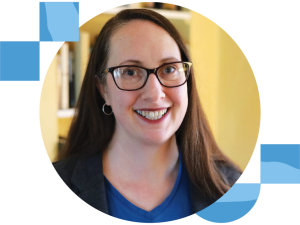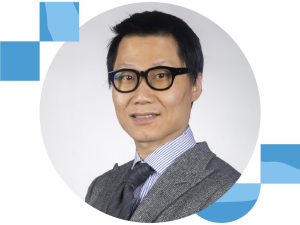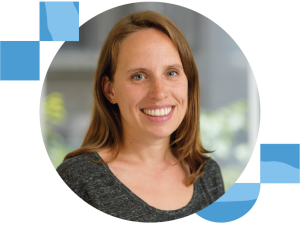by Barbara Wiedemann
Three celebrated research professors have joined the team of social scientists powering the collaborative research engine behind more than $33.5 million in awards this year (Jan. 1–Oct. 30, 2023) at the University of North Carolina at Chapel Hill School of Social Work.
At the start of the 2023–24 academic year, Associate Professor Hsun-Ta Hsu joined UNC School of Social Work from the University of Missouri. Assistant Professor Tess Thompson joined from Brown School at Washington University in St. Louis. A third tenure-track researcher, Assistant Professor Bridgette Thom, joined the School from Memorial Sloan Kettering Cancer Center in New York.
Thompson and Thom are both gaining national recognition for their independent work in social work and cancer, and both were hired by the School in collaboration with the UNC Lineberger Comprehensive Cancer Center. Dr. H. Shelton “Shelley” Earp, longtime director of the center, attributes the partnership to the School of Social Work’s dean.
“The arrival of Dean Denby-Brinson provided UNC Lineberger with a great opportunity to forge a link with a School and a discipline so vital to the care of cancer patients, their families and their communities,” Earp said. “The results are nothing short of spectacular. The recruitment of Drs. Thompson and Thom brings two rising stars in the field of social work and cancer. They have already achieved funding from the National Cancer Institute for their work on the impact of a cancer diagnosis on caregivers and families. Their teaching and research will provide a wonderful outlet for the School’s students and their training in social work will inform the research of the broader Lineberger community.”
Associate Dean for Doctoral Education Mimi Chapman chaired the interdisciplinary search committee for both positions.
“The success of the search demonstrates the power of interdisciplinary work,” Chapman said. “Doctors Thom and Thompson rose to the top of a very strong pool, and we are delighted that they are joining us to forge this new path between the School of Social Work and the Lineberger Comprehensive Cancer Center.”
Hsu brings a social worker’s understanding of the individual and systemic factors behind societal challenges — such as unhoused members of a community — and works with computer scientists to apply machine learning to the quest for better systemic responses. He was hired in collaboration with the UNC School of Data Science and Society.
“Dr. Hsu and his research embodies the school’s commitment to applying data science to solve our world’s most challenging issues,” said UNC School of Data Science and Society Dean Stanley C. Ahalt. “With his use of artificial intelligence to help connect unsheltered individuals to resources, Dr. Hsu is connecting the two disciplines — data science and social work — in service to communities striving to end homelessness. We are so pleased that he is our first joint appointment with the School of Social Work and we look forward to more partnerships.”
Associate Dean for Global Engagement Gina Chowa chaired the search committee who brought Hsu to Carolina.
“Dr. Hsu is an asset and a great addition to the Schools of Social Work and Data Science and Society,” Chowa said. “He has demonstrated his value by serving on a few campuswide artificial intelligence (AI) committees and helping our School to navigate the great potential of using AI to enhance research and learning, but at the same time preparing for challenges that may come with it. His joint appointment at Carolina demonstrates the commitment of the University to use AI to address social disparities.”
The School’s three newest social work experts have more in common than just their pan-university appointments. Hsu, Thom and Thompson each bring a multilevel approach to societal problem-solving in interdisciplinary academic and professional settings. All three advocate for centering the person in interdisciplinary research which can lead the way to improved public policy or systemic approaches to challenges like treating cancer or addressing homelessness.
Thompson: Spanning medicine and social work in search of interventions for cancer caregivers and survivors
 The first Rhodes Scholar to graduate from Pennsylvania State University, Thompson is a State College, Pa., native. The child of two higher education professionals, Thompson parlayed her English degrees from Penn State and Oxford into communications work for a cancer research group in Philadelphia after teaching English at a Raleigh, N.C., charter high school while her husband earned his doctorate in clinical psychology at UNC.
The first Rhodes Scholar to graduate from Pennsylvania State University, Thompson is a State College, Pa., native. The child of two higher education professionals, Thompson parlayed her English degrees from Penn State and Oxford into communications work for a cancer research group in Philadelphia after teaching English at a Raleigh, N.C., charter high school while her husband earned his doctorate in clinical psychology at UNC.
In 2005, Thompson and her family moved to Washington University in St. Louis, where she earned a master’s degree in public health and a doctorate in social work. She then served as a research faculty member at Washington University’s Brown School of Social Work before joining Carolina.
“I realized I was reading a lot of books about marriage and the family and how those affected outcomes, including health outcomes,” she recalled. “I was reading those for fun and realized I could be doing research in these areas. Brown School was a wonderful place to bring the marriage and family interests together with my work in cancer and health communication.”
Both her doctorate and postdoctoral work allowed for an interdisciplinary approach. That helped shape the work she does today, including serving on the editorial board for Social Science & Medicine — an international and interdisciplinary forum for the dissemination of social science research on health.
When Thompson saw her current position posted at the School of Social Work, she remembered, “It was really a dream job for me. The collaboration between the School and Lineberger Comprehensive Cancer Center makes for a wonderful fit.”
Thompson is currently moving into the data analysis phase of dyadic research she started in St. Louis for the American Cancer Society. The study, “Analyzing Outcomes for African American Breast Cancer Patients and Caregivers,” follows Black women with breast cancer and their support people for about 18 months after diagnosis.
“We are asking: ‘Can we see empirical evidence that patients and caregivers are reacting to cancer as a system?’” she said.
Thompson posits that surveying both the patient and their informal caregivers may show a pattern in terms of when people are struggling — independently or at the same time — and when they could use more support.
Fortuitously, Thompson learned she received a five-year R01 grant from the National Institutes for Health’s (NIH) National Cancer Institute (NCI) during her campus visit at Carolina from St. Louis. She later learned that the grant would convert to an R37 mechanism from NCI that will allow her to propose an extension of the project for an additional two years of funding.
“Tess Thompson studies the trajectory of experiences that women along with their caregivers face after a diagnosis with breast or gynecological cancer,” said UNC Gillings School of Public Health colleague Erin E. Kent, Ph.D., M.S. “Her research methods approach women with cancer and their caregivers as a dyad, which help reveal how the health of one might affect the health of another. She has a seven-year grant from the National Cancer Institute to conduct longitudinal surveys with these dyads to help create a targeted screening and intervention to address unmet mental and social needs in women with cancer and their caregivers.”
The upcoming NCI research study, “Dyadic Analysis of Unmet Social Needs Among Breast and Gynecologic Patients and Their Informal Caregivers,” involves surveying lower-income patients and support persons for nine months after the patient’s breast cancer or gynecological diagnosis to look for unmet needs for transportation, food or housing.
“There may be a constellation of responsibilities that people have which can make caregiving more challenging,” Thompson said. “These data may help clarify those needs and eventually analyze the best way to get support and assistance to patients and caregivers.
“We really want to think about: What do patients want help with? What do caregivers want help with? How can you meet people where they are with information about the resources they need?” she said.
She imagines this type of work might move from a therapeutic intervention model to one that reaches patients and caregivers in more brief, targeted ways that provide for some fun or respite time, and in approachable ways that might increase participation.
“We all have limited time. What is it that we can offer people that will make them choose to participate?” she asked.
Alongside her ongoing and upcoming research, Thompson plans to teach “Human Behavior and the Social Environment/Adults” at the School of Social Work this spring.
Hsu: Machine learning as a tool to improve systemic responses to societal challenges
 Hsu trained as a social worker in his native Taiwan. Watching some members of his immediate community struggle with substance use and suicidal ideation motivated him to study how an individual’s family, peers and social network might exacerbate or provide protection against such challenges.
Hsu trained as a social worker in his native Taiwan. Watching some members of his immediate community struggle with substance use and suicidal ideation motivated him to study how an individual’s family, peers and social network might exacerbate or provide protection against such challenges.
Hsu decided to earn his bachelor’s degree in social work from National Taiwan University.
“After my training, I learned that my role might be better defined as working with individuals to improve their lives, rather than working to solve their problems,” Hsu said.
Hsu earned a master’s degree in social work from the University of Michigan and a doctorate from the School of Social Work at the University of Southern California. His research interests include health promotion, homelessness and housing; the study of social networks; and artificial intelligence applications in social science interventions.
When describing his research focus, Hsu talks about the multilevel factors at play in, for example, a person experiencing homelessness. He lists individual factors (things like age, race, past trauma exposure, social network, neighborhood environment, where they are experiencing homelessness, physical/social environment of that neighborhood) and systemic factors (how the communities and the system coordinate to prioritize housing resources to individuals exposed to homelessness so that it is efficient and fair) and how the two intertwine.
Hsu sees himself as a connector who brings both community insight and machine learning into the development of better systematic responses to homelessness.
“My role is to translate findings from data scientists to stakeholders, and vice versa,” Hsu said.
Describing past work with the Los Angeles Housing Authority, Hsu points out that the research team brought together housing providers, private landlords and individuals with lived experience of homelessness. They helped connect community stakeholders and data scientists to collaboratively produce and refine a housing prioritization tool used in that city.
In a colloquium before he accepted the role at Carolina, Hsu explained that most housing studies use census data when looking at inner cities in America. But when he looked out the window or walked around Los Angeles during his doctoral work at USC, he could see that what city dwellers called “Skid Row” and “Gallery Row” were neighborhoods directly next door to one another on the map but worlds apart in terms of perceived safety and livability. Census data could not include things he saw on his walk, the kind of things that might have a major effect on housing: garbage, tents, odors, bad street lighting or graffiti, for example.
The observation led to work that Hsu is currently wrapping up: A three-year Centers for Disease Control (CDC) sponsored research project seeking to understand how multilevel factors affect youth experiencing homelessness: “Understanding Personal, Social Network, and Neighborhood Environmental Contributors to Firearm Access and Violence Among Young Adults Experiencing Homelessness.”
In the CDC study, Hsu and his research team used Google Street View to assess specifics of the neighborhood environment in an effort to produce a more comprehensive data set that could more accurately compare neighborhood environments. They used computers to identify neighborhood characteristics, aided by human power to label those characteristics until the machines got more accurate at identifying a tree, a car, a fence or graffiti — for example.
Hsu is currently principal investigator on a project with the National Alliance to End Homelessness. He sees potential opportunities for collaboration amongst both School of Social Work and School of Data Science and Society colleagues in the wide area of health promotion, including violence prevention, substance use disorder, homelessness, and global collaborations to reduce HIV risk among vulnerable populations.
“Dr. Hsu is one of a very small number of social work researchers across the country who is using AI to tackle wicked social problems, especially homelessness,” said USC Professor Eric Rice. “For example, he is using AI and data science methods to create new vulnerability assessment tools for people experiencing homelessness in rural communities, so as to identify the people most desperately in need of housing assistance.”
Thom: Patient-centered work addressing the financial impact of cancer diagnosis and treatment on young adults

When Thom saw the job posting for her current position at UNC School of Social Work, she sent a screenshot to friends and texted, “This is my job!”
Her enthusiasm stemmed from the job description, which fit her research interests perfectly, and from the admiration she held for the social science and cancer research she had seen presented at conferences by UNC School of Social Work and Lineberger Comprehensive Cancer Center research faculty.
In particular, she cites the work of Carolina’s Adolescent and Young Adult Cancer Program and its program director Lauren Lux, LCSW. Thom contacted Lux to talk about the collaborative UNC School of Social Work/UNC Lineberger assistant professorship she was interested in applying for.
“We chatted about Carolina and about how my research might fit in here,” Thom recalled, “and that confirmed it for me. I thought, ‘Yes, this IS a good fit.’”
She was delighted by how quickly Lux returned her call and even more thrilled when representatives from the UNC Schools of Medicine, Nursing and Allied Health presented questions about her research during her colloquium at the School of Social Work’s Tate-Turner-Kuralt Building.
Thom’s interest in interdisciplinary work runs deep. As an undergraduate, she enjoyed the leeway to develop her own interdisciplinary curriculum, studying U.S. history and politics through the lens of sports at New York University. She developed an interest in how systemic failures and successes impacted individuals.
For her master’s degree at Columbia University, she layered in social work as a mechanism for centering the person in attempts at policy and system improvements, eventually returning to Columbia for her doctorate in social work (social policy and administration). Thom served for almost 19 years in research and teaching roles at Memorial Sloan Kettering Cancer Center and at Columbia before joining Carolina this fall.
Now, she focuses on patient-centered work that looks at the financial impact of cancer diagnosis and treatment.
“My aim,” she said, “is to figure out ways of addressing the patient-level risks of financial hardship and to develop interventions that reach across every level of the health care system that the patient interacts with, from provider to hospital system to broader health insurance and health-related public policies.”
At Memorial Sloan Kettering (MSK), she led a team of researchers that received funding from the National Institutes for Health’s National Cancer Institute (NCI) to focus on young adult cancer survivors and their financial needs: “Enhancing Health Cost Literacy and Financial Capability among Young Adult Cancer Survivors”. Thom and her colleagues are working with young adult survivors to develop and test an interactive online intervention. Survivors in her study identified three key areas to focus on in the intervention. First, the ability to understand the terms surrounding health insurance. Secondly, an understanding of how to manage medical debt. And lastly, general budgeting techniques for young adult cancer patients and survivors.
“We hope to help give young adults the skills needed to navigate the health care and finance worlds by delivering content that they want to receive in ways that they want to receive it,” Thom said. When the pilot study wraps up in 2024, she will seek funding to support a larger program that would allow her to cover more of the topics that arose from her interviews with young adult survivors.
“Dr Thom’s research spans the breadth of scope from policy to patient, all focused on improving the quality of care received and the lived experience of cancer care and survivorship,” said MSK Cancer Center radiation oncologist Dr. Fumiko Chino. “Her specific focus on patients diagnosed at a younger age is an essential under-researched topic given the durable concerns that these patients have with accessing and affording quality care.”
Thom looks forward to teaching the “Human Development in Context” course in the School of Social Work’s new online MSW program.
Related story

UNC School of Social Work grant combines people, big data to combat homelessness
UNC School of Social Work Associate Professor Hsun-ta Hsu combines the compassion of social work with the science of data analytics. His latest grant focused on rural homelessness is from the National Alliance to End Homelessness.

